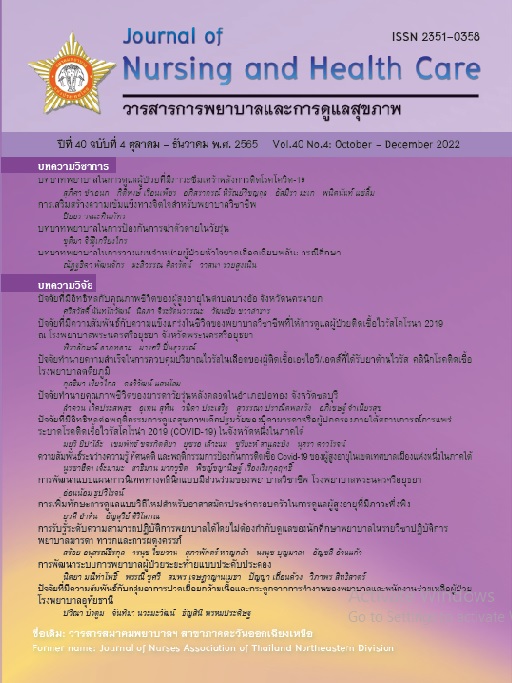การรับรู้ระดับความสามารถปฏิบัติการพยาบาลได้โดยไม่ต้องกำกับดูแลของ นักศึกษาพยาบาลในรายวิชาปฏิบัติการพยาบาลมารดา ทารกและการผดุงครรภ์
คำสำคัญ:
ความสามารถปฏิบัติกิจกรรมการพยาบาลได้โดยไม่ต้องกำกับดูแล, การรับรู้ของนักศึกษาพยาบาล, วิชาการพยาบาลมารดาและทารกบทคัดย่อ
การวิจัยเชิงพรรณนานี้ มีวัตถุประสงค์เพื่อศึกษาการรับรู้ระดับความสามารถปฏิบัติการพยาบาลได้โดยไม่ต้องกำกับดูแล (entrustable professional activities [EPAs]) ของนักศึกษาพยาบาล กลุ่มตัวอย่างเป็นนักศึกษาพยาบาลชั้นปีที่ 4 จำนวน 30 คน ที่ผ่านการฝึกปฏิบัติงานในวิชาปฏิบัติการพยาบาลมารดา ทารกและการผดุงครรภ์ 1 และ 2 ในปีการศึกษา 2565 มหาวิทยาลัยราชธานี วิทยาเขตอุดรธานี โดยใช้แบบประเมิน EPAs แบ่งออกเป็น 5 ระดับ ตั้งแต่ระดับ 1 ถึงระดับ 5 ประกอบด้วยกิจกรรมการพยาบาลทั้งหมด 64 กิจกรรม มีค่าความเชื่อมั่นสัมประสิทธิ์แอลฟาครอนบัคของแบบประเมินเท่ากับ 0.98 โดยให้นักศึกษาตอบแบบประเมินด้วยตนเอง ใช้สถิติเชิงพรรณนาและสถิติวิเคราะห์ไคสแคว์ (x2 test)
ผลการวิจัยพบว่า นักศึกษามี EPAs ในวิชาปฏิบัติการพยาบาลมารดา ทารกและการผดุงครรภ์ 1 ในระดับ 3 ถึงระดับ 5 โดยส่วนใหญ่ร้อยละ 73.4 มี EPAs ระดับ 4 รองลงมาร้อยละ 21.9 อยู่ในระดับ 5 และมี EPAs ระดับ 3 น้อยที่สุด (ร้อยละ 4.7) และเป็นกิจกรรมการพยาบาลในระยะคลอดทั้งหมด ส่วนในวิชาปฏิบัติการพยาบาลมารดา ทารกและการผดุงครรภ์ 2 มี EPAs ในระดับ 4 ถึงระดับ 5 โดยส่วนใหญ่ร้อยละ 53.1 เป็นระดับ 5 ส่วนระดับ 4 พบร้อยละ 46.9 เมื่อทดสอบความแตกต่างของสัดส่วนการรับรู้ระดับ EPAs พบว่าสัดส่วน EPAs ระดับ 5 ในวิชาปฏิบัติการพยาบาลมารดา ทารกและการผดุงครรภ์ 2 เพิ่มขึ้นและมากกว่าในวิชาปฏิบัติการพยาบาลมารดา ทารกและการผดุงครรภ์ 1 อย่างมีนัยสำคัญทางสถิติที่ระดับ .05 สรุปว่าการปฏิบัติการพยาบาลในกิจกรรมซ้ำ ๆ นักศึกษาจะมี EPAs ในระดับที่สูงขึ้น ดังนั้น กิจกรรมการพยาบาลที่มี EPAs ในระดับที่ยังไม่ยอมรับ (ต่ำกว่าระดับ 4) ควรจัดให้นักศึกษาได้ฝึกปฏิบัติมากขึ้น
Downloads
เอกสารอ้างอิง
Al-Moteri M. Entrustable professional activities in nursing: A concept analysis. Int J Nurs Sci 2020; 7(3): 277-84.
Anusornteerakul S, Paokanha R, Chaiwan W, Harnkha S, Korsuk C. Application of entrustable professional activities concept to psychomotor skill development for professional nurses. Journal of Nursing and Health Care 2020; 39(1): 6-13. (in Thai)
Englander R, Flynn T, Call S, Carraccio C, Cleary L, Fulton, TB, et al. Toward defining the foundation of the MD degree: Core entrustable professional activities for enteringresidency. J Assoc Am Med Coll 2016; 91(10): 1352-8.
Royal College of Physicians and Surgeons of Canada. Entrustable professional activity (EPA) fast facts. Canada: Canmeds Royal College Ca; 2016.
Touchie C, Boucher A. Entrustable professional activities for the transition from medical school to residency. Ottawa: The Association of Faculties of Medicine of Canada; 2016.
Surjadi M, Stringari-Murray S, Saxe JM. Entrustable professional activities in nurse practitioner education. J Nurse Pract 2019; 15(5): 97-102. doi:10.1016/J.NURPRA.2018.12.030
National Education Personnel Health Development Foundation. Recommendations for the development of specialized health education for reforming educational institutions and teaching. Nonthaburi: Office of International Health Policy Development Ministry of Public Health; 2017. (in Thai)
Nursing Council. Bachelor of nursing science program: The nursing council’s model program 2021. Nonthaburi: Nursing Council; 2021. (in Thai)
Nursing Council. Nursing council announcement on the core competencies of graduates with a bachelor’s degree. Nonthaburi: Nursing Council; 2018. (in Thai).
Anusornteerakul S, Tienprasert S, Kanchanabatr B. Entrustable professional activities on psychomotor skills among newly graduated nurses. Journal of Nursing and Health Care 2020; 38(1): 69-77. (in Thai)
Hart D, Franzen D, Beeson M, Bhat R, Kulkarni M, Thibodeau L, et al. Integration of entrustable professional activities with the milestones for emergency medicine residents. West J Emerg Med 2019; 20(1): 35-42.
Holzhausen Y, Maaz A, Renz A, Bosch J, Peters H. How to define core entrustable professional activities for entry into residency? BMC Med Educ 2018; 18(1): 87.
Mongkhonsiri P, Kitsomporn J, Thadakant S, Tongvichean S, Anusornteerakul S, Amornrojana-varavutti W, et al. Entrustable professional activities (EPAs) for newly graduated nurses: A preliminary study in Thailand. Nursing Journal of the Ministry of Public Health 2021; 31(1): 161-76. (in Thai)
Rastsadondee K, Tongvichean SC, Tapasee W, Thienfaidee U, Prakobkit K. Determination of the levels of entrustable professional activities for graduated nurses. Thai Journal of Nursing. 2020; 69(4): 50-9. (in Thai)
Anusornteerakul S, Hankha S, Buengmoom N, Ounkaen A, Chaimeekhieo N, Chaiwan W. Expected and actual entrustable professional activities in nursing of newly graduated nurses as perceived by nursing instructors. Journal of Boromarajonani College of Nursing, Surin 2021; 12(1): 1-15. (in Thai)
Fesser HE, Addizzo HD, Beck LM, Buckley JD, Pastores SM, Piquette CA, Spevetz A. Entrustable professional activities and curriculum milestones for fellowship training in pulmonary and critical care medicine: report of a multi-society working group. Chest 2014; 146(3): 813-34.
Rose S, Fix OK, Shah BJ, Jones TN, Szyjkowski RD, Bosworth BP, Sedlack RE. Entrustable professional activities for gastroenterology fellowship training. Gastrointestinal Endoscopy 2014; 80(1): 16-27.
Amy LP, Scott AC, Caitlin KF, Jean YM, Megan RU, Jordan HQ. Entrustable professional activities for pharmacy practice. Am J Pharm Educ 2016; 80(4): 1-4.
Cate OT. Entrustment as assessment: Recognizing the ability, the right, and the duty to act. J Grad Med Educ 2016; 8(2), 261-2.
Nicely KLW, Fairman J. Postgraduate nurse practitioner residency programs: Supporting transition to practice. Academic Medicine: J Assoc Am Med Coll 2015; 90(6): 707-9.
ดาวน์โหลด
เผยแพร่แล้ว
รูปแบบการอ้างอิง
ฉบับ
ประเภทบทความ
สัญญาอนุญาต
ลิขสิทธิ์ (c) 2022 วารสารการพยาบาลและการดูแลสุขภาพ

อนุญาตภายใต้เงื่อนไข Creative Commons Attribution-NonCommercial-NoDerivatives 4.0 International License.



